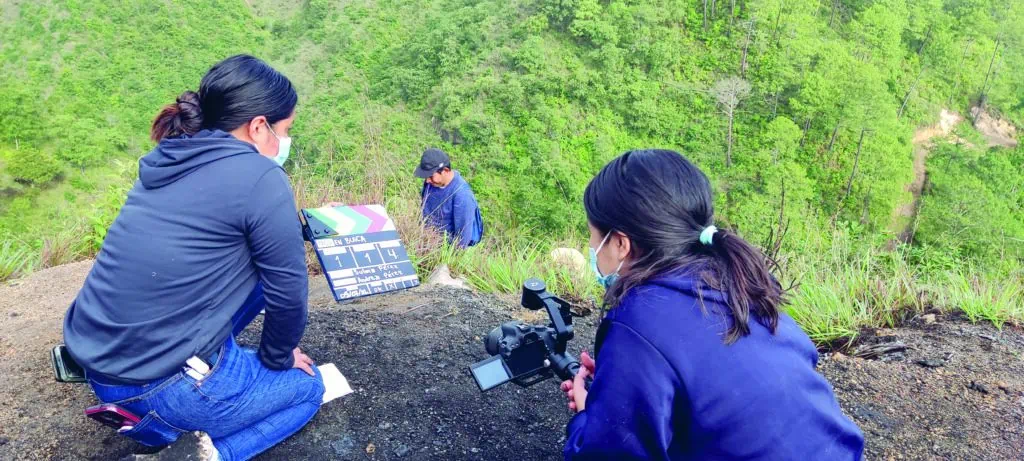More and more young people in El Salvador are turning their backs on their country. However, the dangerous flight to the USA often does not succeed and the young people are turned away and sent back. Our partner organization Acisam offers these young people psychosocial support.
Violence, poverty, discrimination and a lack of life prospects make life difficult for young people in El Salvador. Every year, thousands of young men and women leave their country - often under life-threatening circumstances and with the help of traffickers. The path to a supposedly better future is very dangerous, especially for young women. Despite the great risks, emigration continues to increase. According to the UNHCR, a total of 15,898 people fled El Salvador in 2021 and applied for asylum in other countries. However, many of them do not even make it that far: they are intercepted at the border and sent back home.
"We are not alone"
The young men and women whose dream of a new life has been dashed are often filled with resignation and frustration. After the unsuccessful attempt, they are even more hopeless than before the flight. Many have gone into debt to pay traffickers. Moreover, returnees are stigmatized as failures back in El Salvador. Many of them make the dangerous journey to the north a second and third time, again accepting the violence, hardships and danger to their lives. Acisam accompanies young returnees as they try to break out of their social isolation and find new hope in their old homeland. Marta Garcia* is 19 years old, she tried to emigrate to the USA without success, because her father already lives there. As part of Acisam, she now participates in psychosocial group support and says: "Through this support, I have discovered that I have many more resources than I thought. My environment also offers me unexpected opportunities."
Social and psychological support
Examples like these show how urgent the psychosocial support of young returnees is in El Salvador. The young people are often severely traumatized because they have experienced great dangers and were treated like criminals during deportation. Sandra Ramirez, National Coordinator of terre des hommes Switzerland in El Salvador, emphasizes: "These young people return broken, frustrated and hopeless. To make matters worse, the young returnees are often labeled as criminals and losers in their home communities. They feel like strangers in their old homeland. This is where Acisam comes in, reaching out to young people and restoring their confidence." The project supports young migrants psychologically and socially. Young returnees are interviewed in participatory surveys. Acisam is in exchange with responsible authorities on how to improve the care offer for the young people concerned. In 2022, the young people organized a campaign within Acisam to draw attention to their situation and their needs. They made films themselves and shared them via social media. In projects like these, young people are made experts of their own situation, they mobilize and create joint initiatives to advocate for their own rights and needs. Acisam also gave 22-year-old Luisa Gonzales* new hope after her failed migration: she lived with her mother along with eight younger siblings. As the oldest child, she felt great financial and emotional pressure as she was the main provider for the family. She tried to emigrate to the United States to improve the economic conditions of her family. Today she participates in ACISAM's program and looks more to herself: She is taking an English course and receiving training as an automotive mechanic. Luisa says, "I feel that a big weight has been lifted off my shoulders. I have finally learned to take charge of my own life". Due to the currently very challenging situation for young people in El Salvador, not all young people can be convinced to believe in a future in the country. terre des hommes switzerland therefore also always lives with the risk of losing young employees from projects, as they leave the country despite all the support. This shows that the commitment to young people is still important - also thanks to your valuable support.
More information at: www.tdhs.ch/elsalvador
Unaccompanied juvenile migrants
The surveys that Acisam has conducted so far among young returnees show the following results:
- The majority of unaccompanied migrant children and youth returned from El Salvador are male youth between the ages of 15 and 18.
- The percentage of unaccompanied migrants under the age of 14 is higher for girls than for boys.
- In El Salvador, at least 62 percent of all migrant children and adolescents traveled with traffickers. Here, the proportion is the same for girls and boys.
- Families of young returned unaccompanied migrants reported that 35 percent of households are single-parent households. Most households of unaccompanied migrant minors returning from El Salvador currently have an average of five people living in them.


